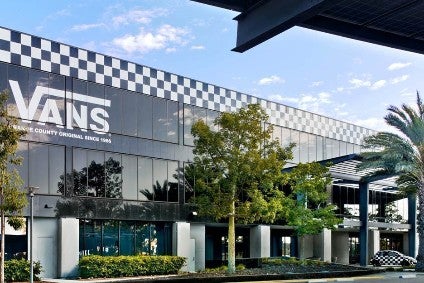
VF Corporation’s action sports brand Vans has pledged a series of new global sustainability commitments that will see it move towards creating circular products and systems that use regenerative and recycled materials, designed to reduce waste and keep products in use and out of landfills.
The brand says it recognises the urgency to move towards circular products and will deploy systems that design out waste, in tandem, aiding the United Nations in achieving the organisation’s Sustainable Development Goal 12 to ensure responsible consumption and production patterns.
The brand is aiming to achieve its new global commitments to environmental sustainability and responsibility by 2030. Among them is a pledge that 100% of Van’s top materials will be regenerative, responsibly sourced, renewable or recycled, including rubber, cotton, leather, and polyester. Additionally, the company will commit to a 43% carbon reduction by:
- Reducing the average impact of top materials by 35% by 2025
- Utilising 50% recycled polyester by 2025
- Sourcing 100% sustainably grown cotton by 2025
Also by 2030, Vans will pilot and scale regenerative, recycled and responsibly sourced materials covering 85% of the brand’s materials. When combined with other programmes like working with suppliers to implement renewable energy in Van’s supply chain, the move to regenerative, recycled and responsibly sourced renewable materials will help the brand achieve its goal of a 30% absolute reduction of scope 3 carbon emissions from a 2017 baseline. This includes:
- Piloting and scaling regenerative agriculture practices on farms and ranches that produce rubber, cotton, and leather then using these materials in its products
- Exploring bio-based alternatives with lower carbon footprints than traditional petroleum-based synthetic materials
- Converting virgin polyester used in its footwear, apparel and accessories to recycled sources
Meanwhile, by 2025, Vans is committed to eliminating all single-use plastic packaging and reducing waste at every point of its business model. This includes:
- No plastic shopping bags in its retail spaces by the end of 2021
- Remaining packaging will be minimised, originated from sustainable sources and designed for recyclability
The brand is also working toward converting all owned and operated facilities to 100% renewable energy by 2025. In 2017, the company began this transition by installing a 1 MW solar array at its headquarters, achieving a LEED platinum certification, one of the highest standards for sustainable buildings in the world.

US Tariffs are shifting - will you react or anticipate?
Don’t let policy changes catch you off guard. Stay proactive with real-time data and expert analysis.
By GlobalDataVans says its recognises a collective effort and cross-collaboration when it comes to creating circularity, adding it will work closely with Terra Genesis, which generates regenerative rubber, and cotton supplier Indigo Ag to achieve these new targets by 2030.
“Enabling creative expression is central to Vans. As a purpose-driven company that is engrained in youth culture, we are leveraging our commitment to creativity to seek new solutions that reimagine the lifecycle of our products and protect the environment for future generations,” said Kim Matsoukas, senior manager of Sustainability at Vans.
“While there’s more work for us to do, through our Vans family, partnerships with PUR Projet, Terra Genesis, and other leading environmental organisations, we’re proud to accomplish these goals by 2030 as we look to create a brighter future for our environment, our communities, and our planet.”



